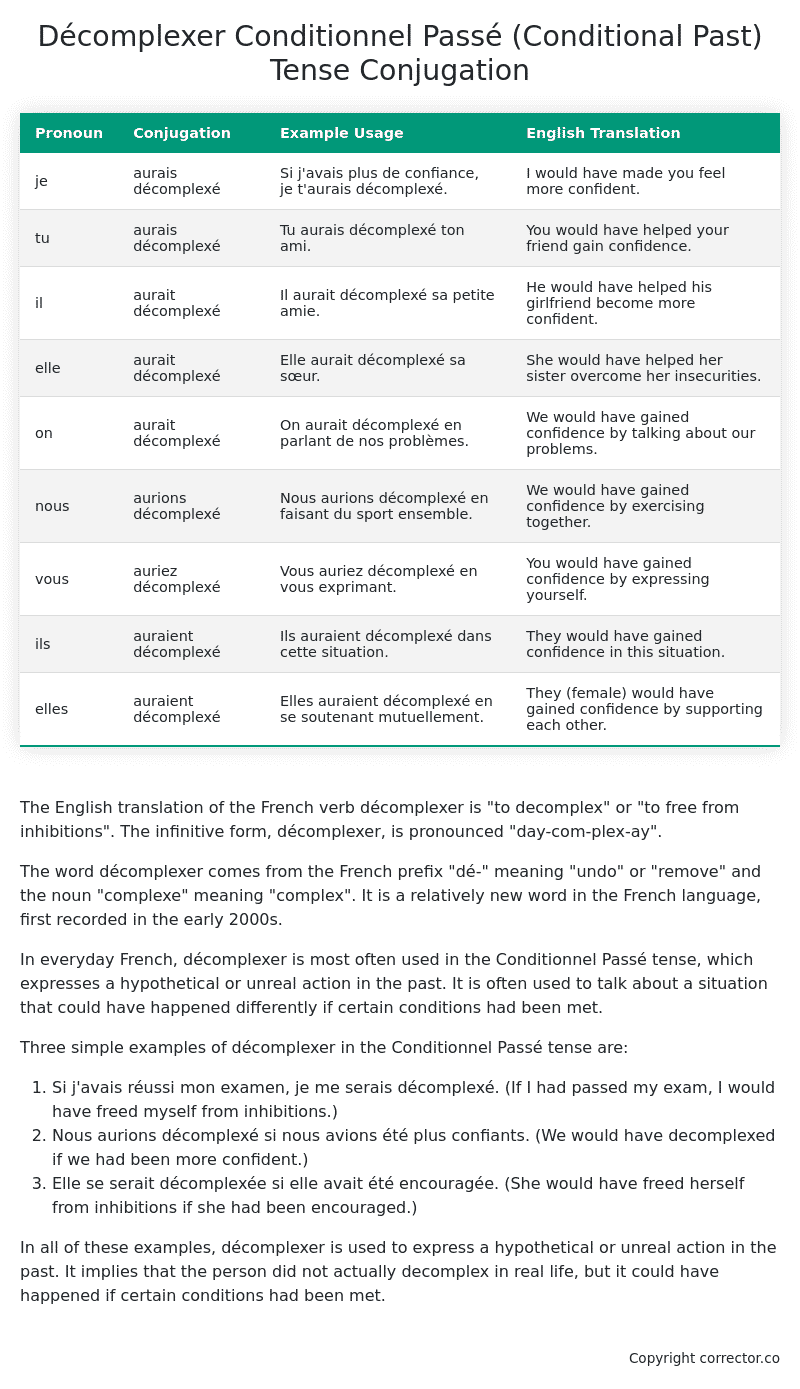Conditionnel Passé (Conditional Past) Tense Conjugation of the French Verb décomplexer
Introduction to the verb décomplexer
The English translation of the French verb décomplexer is “to decomplex” or “to free from inhibitions”. The infinitive form, décomplexer, is pronounced “day-com-plex-ay”.
The word décomplexer comes from the French prefix “dé-” meaning “undo” or “remove” and the noun “complexe” meaning “complex”. It is a relatively new word in the French language, first recorded in the early 2000s.
In everyday French, décomplexer is most often used in the Conditionnel Passé tense, which expresses a hypothetical or unreal action in the past. It is often used to talk about a situation that could have happened differently if certain conditions had been met.
Three simple examples of décomplexer in the Conditionnel Passé tense are:
- Si j’avais réussi mon examen, je me serais décomplexé. (If I had passed my exam, I would have freed myself from inhibitions.)
- Nous aurions décomplexé si nous avions été plus confiants. (We would have decomplexed if we had been more confident.)
- Elle se serait décomplexée si elle avait été encouragée. (She would have freed herself from inhibitions if she had been encouraged.)
In all of these examples, décomplexer is used to express a hypothetical or unreal action in the past. It implies that the person did not actually decomplex in real life, but it could have happened if certain conditions had been met.
Table of the Conditionnel Passé (Conditional Past) Tense Conjugation of décomplexer
| Pronoun | Conjugation | Example Usage | English Translation |
|---|---|---|---|
| je | aurais décomplexé | Si j’avais plus de confiance, je t’aurais décomplexé. | I would have made you feel more confident. |
| tu | aurais décomplexé | Tu aurais décomplexé ton ami. | You would have helped your friend gain confidence. |
| il | aurait décomplexé | Il aurait décomplexé sa petite amie. | He would have helped his girlfriend become more confident. |
| elle | aurait décomplexé | Elle aurait décomplexé sa sœur. | She would have helped her sister overcome her insecurities. |
| on | aurait décomplexé | On aurait décomplexé en parlant de nos problèmes. | We would have gained confidence by talking about our problems. |
| nous | aurions décomplexé | Nous aurions décomplexé en faisant du sport ensemble. | We would have gained confidence by exercising together. |
| vous | auriez décomplexé | Vous auriez décomplexé en vous exprimant. | You would have gained confidence by expressing yourself. |
| ils | auraient décomplexé | Ils auraient décomplexé dans cette situation. | They would have gained confidence in this situation. |
| elles | auraient décomplexé | Elles auraient décomplexé en se soutenant mutuellement. | They (female) would have gained confidence by supporting each other. |
Other Conjugations for Décomplexer.
Le Present (Present Tense) Conjugation of the French Verb décomplexer
Imparfait (Imperfect) Tense Conjugation of the French Verb décomplexer
Passé Simple (Simple Past) Tense Conjugation of the French Verb décomplexer
Passé Composé (Present Perfect) Tense Conjugation of the French Verb décomplexer
Futur Simple (Simple Future) Tense Conjugation of the French Verb décomplexer
Futur Proche (Near Future) Tense Conjugation of the French Verb décomplexer
Plus-que-parfait (Pluperfect) Tense Conjugation of the French Verb décomplexer
Passé Antérieur (Past Anterior) Tense Conjugation of the French Verb décomplexer
Futur Antérieur (Future Anterior) Tense Conjugation of the French Verb décomplexer
Subjonctif Présent (Subjunctive Present) Tense Conjugation of the French Verb décomplexer
Subjonctif Passé (Subjunctive Past) Tense Conjugation of the French Verb décomplexer
Subjonctif Imparfait (Subjunctive Imperfect) Tense Conjugation of the French Verb décomplexer
Conditionnel Présent (Conditional Present) Tense Conjugation of the French Verb décomplexer
Conditionnel Passé (Conditional Past) Tense Conjugation of the French Verb décomplexer (this article)
L’impératif Présent (Imperative Present) Tense Conjugation of the French Verb décomplexer
L’infinitif Présent (Infinitive Present) Tense Conjugation of the French Verb décomplexer
Struggling with French verbs or the language in general? Why not use our free French Grammar Checker – no registration required!
Get a FREE Download Study Sheet of this Conjugation 🔥
Simply right click the image below, click “save image” and get your free reference for the décomplexer Conditionnel Passé tense conjugation!

Décomplexer – About the French Conditionnel Passé (Conditional Past) Tense
Formation
Common Everyday Usage Patterns
Expressing Unreal Past Scenarios
Polite Requests or Suggestions
Expressing Doubt or Uncertainty
Interactions with Other Tenses
Conditional Present
Indicative Past Tenses
Conditional Future
Summary
Want More?
I hope you enjoyed this article on the verb décomplexer. Still in a learning mood? Check out another TOTALLY random French verb conjugation!


